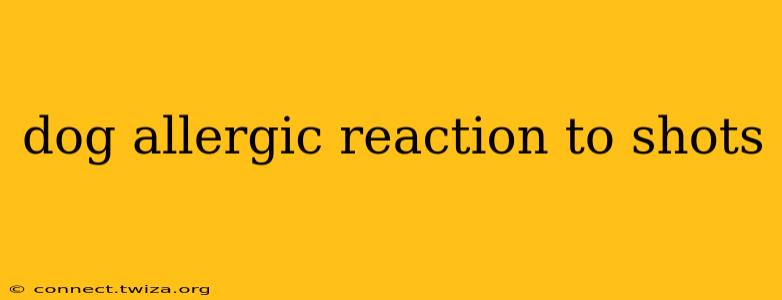Giving your canine companion vaccinations is crucial for their health and well-being. However, like humans, dogs can sometimes experience allergic reactions to these injections. Understanding how to recognize, treat, and prevent these reactions is essential for responsible pet ownership. This comprehensive guide will delve into the various aspects of dog allergic reactions to shots, providing you with the information you need to keep your furry friend safe and healthy.
What are the Signs of an Allergic Reaction in Dogs After Shots?
Recognizing the signs of an allergic reaction is the first step in effective management. Reactions can range from mild to severe, and the speed of onset varies. Mild reactions might appear within minutes to hours, while more severe, life-threatening reactions can occur within seconds. Be vigilant and seek immediate veterinary attention if you observe any of the following:
- Hives (Urticaria): Raised, itchy welts appearing on the skin.
- Swelling: Facial swelling (especially around the muzzle and eyes), paw swelling, or swelling at the injection site.
- Itching: Excessive scratching, licking, or biting at the injection site or other body areas.
- Vomiting and Diarrhea: Gastrointestinal upset is a common sign of allergic reaction.
- Difficulty Breathing: Wheezing, coughing, or labored breathing are serious indicators requiring immediate veterinary attention. This can indicate anaphylaxis, a life-threatening condition.
- Collapse: A sudden loss of consciousness is a critical sign of a severe allergic reaction.
- Pale Gums: Indicates decreased blood flow and can be a sign of shock.
What Should I Do If My Dog Has an Allergic Reaction to a Shot?
If you suspect your dog is experiencing an allergic reaction, immediate veterinary attention is crucial. Do not attempt to treat the reaction at home. While waiting for veterinary care, you can:
- Keep your dog calm and quiet: Reduce stress and excitement to help stabilize their condition.
- Monitor their breathing: Observe for any signs of difficulty breathing.
- Note the time of onset and severity of symptoms: This information will be crucial for your veterinarian.
How Are Allergic Reactions to Shots Diagnosed in Dogs?
Your veterinarian will perform a thorough physical examination, assessing your dog's symptoms and history. They may also perform blood tests to rule out other underlying conditions. In some cases, skin testing might be recommended to identify the specific allergen causing the reaction.
Can I Prevent Allergic Reactions to Shots in My Dog?
While you cannot completely eliminate the risk of an allergic reaction, there are steps you can take to minimize it:
- Discuss your dog's medical history with your veterinarian: Inform them of any previous allergic reactions your dog has experienced, whether to medications, food, or other substances.
- Ask about pre-medication: Your vet may prescribe antihistamines or other medications to be given before the vaccination to reduce the risk of a reaction.
- Closely monitor your dog after vaccination: Observe for any signs of an allergic reaction for at least 24 hours after the shot.
What are the Long-Term Effects of an Allergic Reaction to Shots?
The long-term effects depend on the severity of the reaction. Mild reactions typically resolve without lasting consequences. However, severe reactions, especially anaphylaxis, can be life-threatening and may require ongoing management, including desensitization therapy.
What is Desensitization Therapy for Dogs?
Desensitization therapy is a process where your dog is gradually exposed to increasing amounts of the allergen (the vaccine component causing the reaction) over time to build tolerance. It's a long-term commitment, but it can significantly reduce the severity of future reactions.
My Dog Had a Mild Reaction, Should I Still Give Him Future Shots?
Even with a mild reaction, it's crucial to discuss your dog's experience with your veterinarian before administering future shots. They can advise on appropriate precautions and management strategies. It doesn't necessarily mean all future vaccinations are impossible, but careful consideration is vital.
Can Certain Dog Breeds Be More Prone to Allergic Reactions to Shots?
While there isn't definitive data on specific breeds being inherently more prone to vaccine reactions, individual sensitivity varies across all breeds. A thorough discussion with your veterinarian about your dog's breed-specific predispositions is always recommended.
This information is intended for educational purposes only and should not be considered a substitute for professional veterinary advice. Always consult with your veterinarian for any concerns regarding your dog's health. Early detection and prompt veterinary care are crucial in managing allergic reactions to shots in dogs and ensuring their well-being.
